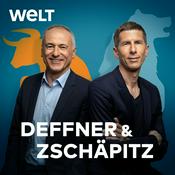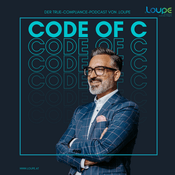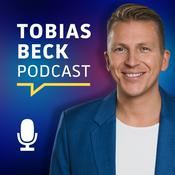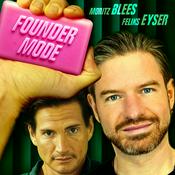Epicenter - Learn about Crypto, Blockchain, Ethereum, Bitcoin and Distributed Technologies
Epicenter Media Ltd.
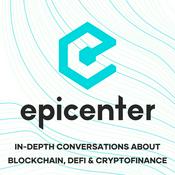
Neueste Episode
665 Episoden
- In this episode, host Friederike Ernst is joined by Michael Svoboda, CEO of Liquid AG, to discuss Liquity V2 and the launch of the BOLD stablecoin. Michael explains how Liquity maintains a governance-free, immutable architecture to provide "sovereign dollars" that are not dependent on human committees or centralized backstops. He introduces user-set interest rates, a novel DeFi primitive where borrowers determine their own rates to balance their cost of capital against the risk of being redeemed by stablecoin holders.
They explore the technical mechanics of the BOLD stablecoin, its multi-collateral backing of ETH and LSTs, and why the protocol funnels 100% of fees directly to users rather than extracting rent. Michael also shares his analogy of crypto-native stablecoins as "electric engines" that offer a fundamentally different risk profile from traditional banking rails. Finally, the conversation dives into the impact of global regulations like MiCA and why the future of finance belongs to peer-to-peer credit markets.
Topics
00:00 Intro & Context
04:15 Why Banking is Under Pressure
09:30 From V1 to Liquity V2
15:00 User-Set Rates Explained21:45 Redemptions & Peg Stability
27:10 Collateral Risk: ETH & LSTs
35:20 Cefi vs. Defi Risk Spectrum
42:15 Is Immutability Dogmatic?
49:00 Revenue Distribution & Self-Sustainability
55:30 Non-USD Stables & Global Shifts
Links
Michael on X: https://x.com/svobodamichael
Liquity: https://www.liquity.org/
Bluechip: https://bluechip.org/
Lido: https://lido.fi/stvaults?mtm_campaign=epicenter
Sponsors:
Lido V3 introduces stVaults: modular staking infrastructure that lets builders and institutions deploy custom staking vaults, while staying anchored to stETH as a shared liquidity layer. Get started building with Lido V3 today: https://lido.fi/stvaults?mtm_campaign=epicenter - In this episode, host Friederike Ernst is joined by Thomas Thiery, a researcher at the Ethereum Foundation, to discuss EIP-7805 and the implementation of FOCIL (Fork-Choice Enforced Inclusion Lists). Thomas explains how the rise of MEV (Maximal Extractable Value) has created a centralized builder market where a few actors now control over 85% of Ethereum's block production, creating a dangerous bottleneck for censorship. FOCIL addresses this by empowering a decentralized committee of 16 validators to mandate transaction inclusion, making any block that ignores these lists invalid.
They explore the "Tornado Cash" moment and the risks of "silent censorship" for competitive or regulatory reasons. Thomas explains why FOCIL intentionally prioritizes the public mempool over MEV-heavy transactions to prevent the system from being co-opted. Finally, the conversation looks at the future of the Ethereum roadmap, including the Osaka fork and the technical trade-offs between inclusion lists and long-term privacy solutions like encrypted mempools.
Topics
00:00 Intro & FOCIL
04:15 MEV & Centralization
09:30 The Builder-Searcher Pipeline
15:00 Silent Censorship Risks
21:45 FOCIL Architecture & Committees
27:10 Validity Rules for Attestors
35:20 Spam Protection & Invalid TXs
42:15 FOCIL vs. Encrypted Mempools
49:00 EIP-7805 Status & Fork Timelines
55:30 Future: PQC & ZK EVM
Links
Thomas Thiery on X: https://x.com/soispoke
Ethereum Foundation: https://ethereum.foundation/
EIP-7805 (FOCIL): https://eips.ethereum.org/EIPS/eip-7805
Gnosis: https://gnosis.io/
Sponsors: Gnosis: Gnosis has been building core decentralized infrastructure for the Ethereum ecosystem since 2015. With the launch of Gnosis Pay last year, we introduced the world's first Decentralized Payment Network. Start leveraging its power today at http://gnosis.io - In this episode, we are joined by Zach Abrams, CEO of Bridge, to unpack the infrastructure behind the next generation of global payments. Zach discusses Bridge’s mission to move stablecoins beyond mere trading use cases and into core financial services, a vision that recently led to its landmark acquisition by Stripe . He explains how stablecoins function as an innovation at every layer of the money stack, enabling payments that are fundamentally faster and cheaper than legacy systems like ACH or SEPA.
They delve into the technical "puzzle pieces" of payments, from the inefficiencies of FBO bank accounts to the "cheat code" of compounding growth in the stablecoin sector. Zach introduces the concept of Stablecoin Orchestration and details why the current USDC/USDT duopoly is unaligned with high-velocity payments due to rent-seeking burn fees and AUM-focused models . Finally, the conversation explores the future of consumer finance, where non-custodial wallets act as bank replacements and a pluralistic ecosystem of local, company-issued stablecoins challenges the dominance of the US dollar
Topics
00:00 Intro & Context
04:15 Legacy Rails vs. Stablecoin Innovation
09:30 The "Cash App" Hack & Payments Creativity
15:00 Why Bridge Joined Stripe
21:45 Maslow’s Hierarchy of Startup Needs
27:10 Stablecoin Orchestration & Issuance Explained
35:20 The Duopoly Problem: Why USDC/USDT Isn't Enough
42:15 Orthogonal Competition: The "Europe" of Stablecoins
49:00 Wallets as the New Primary Bank Account
55:30 Regrets of a "Child of the Depression" Founder
Links
Zach Abrams on X: https://x.com/ZCAbrams
Bridge: https://bridge.xyz
Stripe: https://stripe.com
Gnosis: https://gnosis.io/
Sponsors: Gnosis: Gnosis has been building core decentralized infrastructure for the Ethereum ecosystem since 2015. With the launch of Gnosis Pay last year, we introduced the world's first Decentralized Payment Network. Start leveraging its power today at http://gnosis.io - In this episode, recorded live at Buidl Europe 2026, host Sebastian Couture leads a panel with Ben Lakoff (Bankless Ventures), Richard Muirhead (Fabric Ventures), Aurora Orellana (G20 Strategies), and Matthew Arrow (Dark Forest). Together, they tackle the existential question facing the industry: can Cypherpunk values like self-custody and permissionless survive as multi-billion dollar institutions become the primary drivers of adoption?
The discussion delves into the tension between individual sovereignty and the regulatory reach of organizations like the FATF, which they describe as a "Goliath" accountable to no one. They explore the concept of the "DeFi Mullet" a centralized user interfaces powered by decentralized backends and how privacy tech is becoming essential not for institutions seeking defensible competitive moats. Finally, the conversation looks at how global competition between jurisdictions will define the next decade of financial freedom and what it truly means to be a Cypherpunk in 2026.
Topics
00:00 Intro & Context
04:15 Cypherpunk Values in an Institutional World
09:30 Permissionless Deployment & Self-Custody
15:00 The Regulatory Spectrum: KYC vs. Freedom
21:45 The FATF & Global Financial Surveillance
27:10 Jurisdictional Competition & Portability
35:20 Selling Privacy to Institutions vs. Individuals
42:15 The DeFi Mullet & Atomic Settlement
49:00 Barriers to Entry: Legacy Mainframes & Career Risk
55:30 What it Means to be a Cypherpunk in 2026
Links
Ben Lakoff on X: https://x.com/benlakoff
Richard Muirhead on X: https://x.com/RichardMuirhead
Matthew Arrow on X: https://x.com/mattarrow
Bankless Ventures: https://bankless.ventures/
Fabric Ventures: https://www.fabric.vc/
Gnosis: https://gnosis.io/
Sponsors: Gnosis: Gnosis has been building core decentralized infrastructure for the Ethereum ecosystem since 2015. With the launch of Gnosis Pay last year, we introduced the world's first Decentralized Payment Network. Start leveraging its power today at http://gnosis.io - In this episode, host Brian Crain is joined by Gracy Chen, CEO of Bitget, to discuss the exchange's rapid ascent and its ambitious roadmap for 2026. Gracy shares her journey from a mathematics background and journalism into the C-suite of a top-tier exchange, detailing Bitget's growth from a team of 150 to over 2,200 employees. She outlines the concept of the "Universal Exchange" (UEX) a unified platform where the boundaries between crypto, tokenized equities, and commodities effectively disappear.
They explore how Bitget is leveraging Generative Engine Optimization (GEO) and AI-driven advisory tools like Get Agent to redefine user acquisition and trading intelligence. Gracy also provides a candid outlook on the "altcoin fading" phenomenon, arguing that the market is shifting toward blue-chip assets and real-world utility. Finally, they discuss the immense challenges of global regulatory compliance, including Bitget’s priorities for securing MiCA licenses and navigating a potential entry into the complex US market.
Topics
- 00:00 Intro & Crypto Beginnings
- 05:45 The Origin of Bitget
- 10:15 The "Universal Exchange" (UEX) Vision
- 16:30 Tokenized Stocks vs. TradFi Brokers
- 22:00 Competition: CEX, DEX, & Robinhood
- 28:15 AI in Trading: Get Agent & GEO
- 34:40 The State of Altcoins in 2026
- 41:00 Global Compliance: MiCA & US Markets
- 55:30 2026 Market Predictions
Links
- Gracy Chen on X: https://x.com/GracyBitget
- Bitget: https://www.bitget.com/
- Bitget Wallet: https://web3.bitget.com/
- Gnosis: https://gnosis.io/
Sponsors: Gnosis: Gnosis has been building core decentralized infrastructure for the Ethereum ecosystem since 2015. With the launch of Gnosis Pay last year, we introduced the world's first Decentralized Payment Network. Start leveraging its power today at http://gnosis.io
Weitere Wirtschaft Podcasts
Trending Wirtschaft Podcasts
Über Epicenter - Learn about Crypto, Blockchain, Ethereum, Bitcoin and Distributed Technologies
Epicenter brings you in-depth conversations about the technical, economic and social implications of cryptocurrencies and blockchain technologies. Every week, we interview business leaders, engineers academics and entrepreneurs, and bring you a diverse spectrum of opinions and points of view.
Epicenter is hosted by Sebastien Couture, Brian Fabian Crain, Friederike Ernst, Meher Roy and Felix Lutsch. Since 2014, our episodes have been downloaded over 8 million times.
Podcast-WebsiteHöre Epicenter - Learn about Crypto, Blockchain, Ethereum, Bitcoin and Distributed Technologies, Alles auf Aktien – Die täglichen Finanzen-News und viele andere Podcasts aus aller Welt mit der radio.at-App

Hol dir die kostenlose radio.at App
- Sender und Podcasts favorisieren
- Streamen via Wifi oder Bluetooth
- Unterstützt Carplay & Android Auto
- viele weitere App Funktionen
Hol dir die kostenlose radio.at App
- Sender und Podcasts favorisieren
- Streamen via Wifi oder Bluetooth
- Unterstützt Carplay & Android Auto
- viele weitere App Funktionen


Epicenter - Learn about Crypto, Blockchain, Ethereum, Bitcoin and Distributed Technologies
Code scannen,
App laden,
loshören.
App laden,
loshören.




